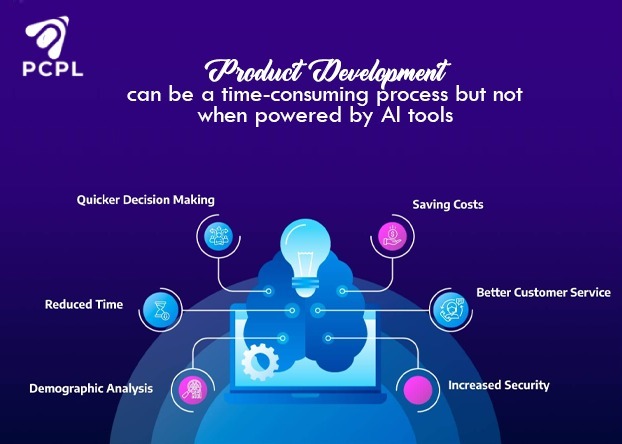
Gaining the Advantage of Artificial Intelligence for Product Development and Entrepreneurship
Artificial Intelligence or AI as we all commonly know, stands out as a transformative force, reshaping industries and offering new avenues for innovation. AI has shown quite some potential in product development and entrepreneurship.
Product development is a complex journey that involves ideation, prototyping, testing, and iteration. Traditionally, this process could be time-consuming and resource-intensive. However, AI-powered tools are changing the game by automating various stages of product development.
Entrepreneurs are eagerly adopting the latest technology of AI. According to an October 2023 report from the Small Business and Entrepreneurship Council, 75% of the surveyed small businesses (507 out of 676) were utilizing AI tools in their operations.
The rate of adoption rose alongside the size of the business, suggesting greater effectiveness at larger scales. Among the surveyed companies, primary areas of AI application included email marketing (32%), logo and branding image creation (28%), transcription (26%), predictive analysis (23%), sales team support (21%), and translation (17%).
Despite the relatively modest scale of AI investment (with a median of $1,800 annually), 83% of small business owners surveyed expressed their intent to either maintain or increase their AI spending in 2024.
Curious to know how and what AI is doing for businesses in the stages of product development?
Keep reading.
Stages of product development as revolutionized by AI –
Idea Generation and Market Analysis
AI algorithms can analyze vast amounts of data from diverse sources to identify market trends, consumer preferences, and emerging opportunities. This data-driven approach helps entrepreneurs generate innovative ideas aligned with market needs, reducing the risk of developing products that lack demand.
Prototyping and Design
AI-enabled design tools leverage machine learning algorithms to generate and optimize product prototypes based on user input and design constraints. These tools accelerate the prototyping phase, enabling entrepreneurs to quickly iterate and refine their product designs before moving into production.
Predictive Analytics for Decision-making
Predictive analytics powered by AI algorithms enable entrepreneurs to make data-driven decisions throughout the product development lifecycle. By analyzing historical data and market trends, entrepreneurs can forecast demand, optimize pricing strategies, and anticipate customer preferences, minimizing the risk of product failure.
Enhancing Customer Experience
Delivering exceptional customer experiences is essential for entrepreneurial success. AI plays a crucial role in enhancing customer experiences by personalizing interactions, optimizing workflows, and improving customer support services.
Personalization
AI-powered recommendation engines analyze customer data to deliver personalized product recommendations and tailored experiences. Whether it’s suggesting relevant products based on past purchases or customizing marketing messages, personalization fosters stronger customer relationships and increases engagement.
Chatbots and Virtual Assistants
Chatbots and virtual assistants powered by natural language processing (NLP) algorithms provide round-the-clock customer support, addressing inquiries, and resolving issues in real-time. By automating routine tasks and inquiries, entrepreneurs can free up resources and focus on value-added activities.
Sentiment Analysis
AI algorithms can analyze social media feeds, customer reviews, and online forums to gauge customer sentiment and feedback. By monitoring sentiment in real-time, entrepreneurs can identify emerging issues, address customer concerns promptly, and refine their products and services accordingly.
Optimizing Operations and Efficiency
Entrepreneurs face numerous operational challenges, from supply chain management to inventory optimization. AI-driven solutions offer insights and automation capabilities that streamline operations and improve efficiency.
Supply Chain Optimization
AI algorithms optimize supply chain processes by predicting demand, identifying potential bottlenecks, and recommending inventory levels. By optimizing inventory management and logistics, entrepreneurs can minimize costs, reduce lead times, and enhance overall supply chain efficiency.
Predictive Maintenance
In industries reliant on machinery and equipment, AI-powered predictive maintenance systems analyze sensor data to forecast equipment failures before they occur. By proactively addressing maintenance issues, entrepreneurs can minimize downtime, extend equipment lifespan, and ensure uninterrupted operations.
Workflow Automation
AI-driven automation tools streamline repetitive tasks and workflows, increasing productivity and reducing human error. Whether it’s automating data entry, scheduling appointments, or managing customer inquiries, automation frees up valuable time for entrepreneurs to focus on strategic initiatives.
As AI continues to advance, its impact on product development and entrepreneurship will only grow stronger. However, it’s essential to approach AI adoption thoughtfully, considering ethical implications, data privacy concerns, and potential biases. To be prepared you should be aware of the legal regulations surrounding AI usage.
What are they?
Legal Regulations Surrounding AI Usage –
As AI becomes increasingly integrated into various aspects of product development and entrepreneurship, entrepreneurs need to navigate the legal and regulatory landscape surrounding AI usage. While AI offers immense potential for innovation and growth, it also raises ethical and legal considerations that must be addressed which are-
● Data Protection and Privacy Laws
Data protection and privacy laws impose strict requirements on the collection, processing, and storage of personal data. Entrepreneurs leveraging AI must ensure compliance with these regulations to protect the privacy rights of individuals and avoid costly penalties for non-compliance.
● Bias and Discrimination
AI algorithms can inadvertently perpetuate bias and discrimination if not properly designed and implemented. To address this concern, there are a few regulations that aim to promote transparency and accountability in AI systems. Entrepreneurs must be mindful of bias mitigation techniques and ensure fairness and equity in their AI-driven products and services.
● Intellectual Property Rights
Entrepreneurs developing AI technologies may encounter intellectual property (IP) issues related to patents, copyrights, and trade secrets. It’s essential to protect AI innovations through appropriate IP strategies and ensure compliance with relevant laws and regulations governing IP rights. Additionally, entrepreneurs must respect the IP rights of others and avoid infringing on existing patents or copyrights.
● Product Liability
AI-driven products and services raise complex questions regarding product liability and accountability. In cases where AI systems cause harm or damage, determining liability can be challenging, especially if the decision-making process is opaque or influenced by factors outside human control. Entrepreneurs must consider the legal implications of AI usage and take measures to mitigate risks associated with product liability.
● Ethical Guidelines and Standards
Various organizations and industry groups have developed ethical guidelines and standards for AI usage. While these guidelines are not legally binding, they provide valuable frameworks for ethical AI development and deployment. Entrepreneurs should familiarize themselves with these guidelines and incorporate ethical considerations into their AI strategies and practices.
● International Regulations
AI regulation is a rapidly evolving field, with governments and international organizations exploring frameworks for AI governance and oversight. Entrepreneurs operating in multiple jurisdictions must stay abreast of evolving regulations and ensure compliance with international standards.
How can PCPL help you avail the benefits of AI?
While the potential of AI for product development and entrepreneurship is vast, realizing its benefits requires strategic planning and the right expertise. Here’s where PCPL is of help with its product development outsourcing service where it employs the best means and resources to deploy solutions that are AI-powered.
They are the best at the job because they offer-
-
Access to AI Expertise
PCPL offers access to a team of AI experts with deep domain knowledge and technical expertise. Whether entrepreneurs are looking to integrate AI-powered features into their products or develop custom AI solutions, PCPL’s team can provide guidance and support at every stage of the process.
-
Tailored Solutions for Your Business
PCPL understands that every business is unique, with its own set of challenges and opportunities. By collaborating closely with entrepreneurs, PCPL develops tailored AI solutions that address specific business needs and objectives. Whether it’s optimizing supply chain operations, enhancing customer experiences, or improving decision-making processes, PCPL’s solutions are designed to deliver measurable results.
-
Seamless Integration and Implementation
Implementing AI solutions can be daunting, especially for entrepreneurs with limited technical expertise. PCPL offers seamless integration and implementation services, ensuring that AI solutions are deployed effectively and integrated seamlessly with existing workflows and systems. From data migration to staff training, PCPL handles all aspects of the implementation process, allowing entrepreneurs to focus on growing their businesses.
-
Continuous Support and Maintenance
AI solutions require ongoing support and maintenance to ensure optimal performance and reliability. PCPL provides continuous support and maintenance services, monitoring AI systems, addressing issues promptly, and implementing updates and enhancements as needed. With PCPL’s support, entrepreneurs can rest assured that their AI solutions are always running smoothly and delivering maximum value to their businesses.
